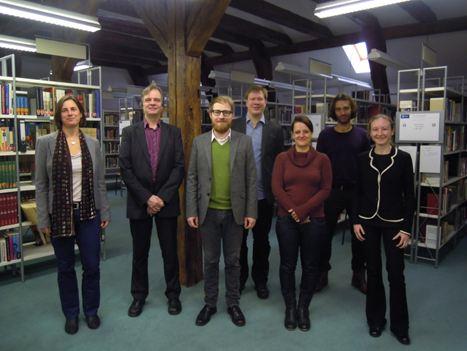3./4. November 2012, moderiert von Prof. Dr. Hans van Wees (London)
Das Seminar fand in der Leucorea in Lutherstadt Wittenberg statt. Teilgenommen haben – auf Einladung durch den Vorstand der Mommsen-Gesellschaft – folgende Jungmitglieder:
Wolfgang Filser (München)
Christian Fron (Stuttgart)
Nancy Richter (Halle)
Karoline Rolle (Halle)
Frank Ursin (Leipzig)

Moderiert wurde das Seminar auf ausgesprochen angenehme und diskussionsanregende Weise von Prof. Dr. Hans van Wees, einem international renommierten Althistoriker (Wirtschafts- und Sozialgeschichte des archaischen und klassischen Griechenlands), der seit 1995 am UC London lehrt. Das Seminar wurde in Form einer Doktorandentagung abgehalten (Verkehrssprache: Englisch). Die Teilnehmenden hielten einen Vortrag von 30 Minuten, der im Anschluss ca. 30 Minuten inhaltlich diskutiert und hinsichtlich seiner Präsentation kommentiert wurde. Alle Aspekte – Gehalt des Vortrags, Darstellungsweise, Diskussions- und Moderationsverhalten – waren dabei Gegenstand der Beobachtung und kritischen Evaluation im Sinne eines Kompetenztrainings. Den Abschluss des Tagungsprogramms (siehe unten) bildete eine Arbeitseinheit zur Vermittlung wissenschaftlicher Forschungsergebnisse für ein breiteres Publikum.
Ausgeschrieben worden war das Seminar Ende Juni 2012 auf der Homepage der Mommsen-Gesellschaft mit folgender Themensetzung:
The theme of ‘luxury and austerity in the ancient world’ is designed to raise a wide range of questions about society, economy, politics and culture and to embrace the study of history, literature and material culture. The concept of ‘luxury’ (luxuria, truphe, etc.), prominent in the works of many ancient authors, implies exceeding appropriate limits of consumption and in lifestyle generally, while ‘austerity’ (austeritas, austerotes), a much less well-established concept in antiquity, has in modern usage come to be its antonym, indicating consumption and lifestyle below a certain norm. But by what standards are these extremes measured? What other normative concepts are applied to consumption? Who define and enforce such norms? And why? In attempting to answer such broad questions, one might study how the vocabulary of ‘luxury’ and related words was deployed in literature, how conspicuous display or ostentatious restraint might have shaped the archaeological record and artistic production, or how ancient societies tried to influence patterns of spending, and conversely how patterns of spending shaped social and cultural differences in ancient societies. Comparative study of luxury and austerity in Greece and Rome, or other ancient and indeed modern societies, may prove especially illuminating – not least since the topic is of such topical interest, with ‘austerity measures’ currently high on the political agenda, and apparently increasing resentment at the ‘luxurious’ lifestyles of the very wealthy.
Tagungsprogramm
Saturday, November 3rd
9:30-10:00
welcome & getting acquainted session (Hans van Wees)
10.00-11:10
speaker: Frank Ursin: "Reform or Revolution? Lucian's 'Saturnalia' as a cyncic discourse about luxury and austerity"
chair: Karoline Rolle
respondent: Christian Fron
11:40- 12:50
speaker: Christian Fron: "The necessary compromise during a travel. Luxury, austerity and mobility between the 1st and 4th century AD"
chair: Nancy Richter
respondent: Frank Ursin
14:30-15:40
speaker: Wolfgang Filser: "Die Elite Athens auf der attischen Luxuskeramik"
chair: Christian Fron
respondent: Karoline Rolle
15:40-16:50
speaker: Nancy Richter: "From tradeswoman to upper-class woman: Some observations on the deal with women’s luxury and austerity in the speeches in classical Athens"
chair: Frank Ursin
respondent: Wolfgang Filser
17:30-18:40
speaker: Karoline Rolle: "A life in luxury – The Tryphé of the Etruscans seen by Greek authors"
chair: Wolfgang Filser
respondent: Nancy Richter
Sunday November 4th
9:30-12:00
Workshop: 'Presenting research to the wider world' (Hans van Wees)
12:00-12:30
Evaluation of the seminar
13:30-15:00
Visiting Wittenberg – Guided Tour
Für die Veranstalter: Dr. Anne Friedrich




